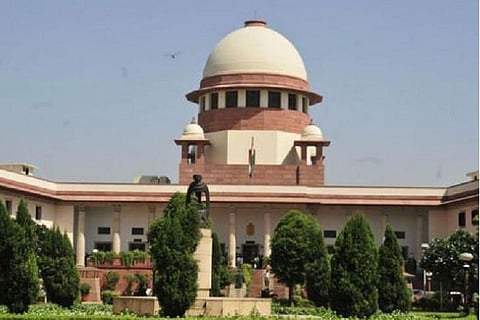

The Supreme Court on Friday dismissed a plea seeking stay on further sale of electoral bonds ahead of assembly elections. A bench headed by Chief Justice SA Bobde declined to stay sale of the electoral bonds as sought in the application moved by the NGO, Association for Democratic Reforms.
The Supreme Court said that sufficient safeguards are present and there is no justification to stay the electoral bonds at present.
The Centre had earlier told the bench, also comprising Justices A S Bopanna and V Ramasubramanian, that the bonds would be issued from April 1 to April 10.
The NGO had claimed that there is a serious apprehension that any further sale of electoral bonds before the upcoming assembly elections, including in West Bengal and Assam, would further increase illegal and illicit funding of political parties through shell companies.
The Supreme Court had on Wednesday flagged the issue of possible misuse of funds received through electoral bonds by political parties for illegal purposes like terrorism and asked the Centre whether there was any control over how these funds were put to use. A bench headed by Chief Justice S A Bobde told Attorney General K K Venugopal that the government should look into this issue of possible misuse of funds received through electoral bonds for illegal purposes like terrorism.
“What is the control of the government on how the money is put to use?” the bench, also comprising Justices AS Bopanna and V Ramasubramanian, asked Venugopal.
During the hearing, the top court said suppose a political party wants to encash electoral bonds and finance a protest, what is the government's control on how this fund is put to use.
The funds can be misused for illegal purposes like terrorism. We would like you, as the government, to look into this aspect, the bench said, adding that political parties may use these funds for activities beyond their political agenda.
“If a political party receives electoral bonds worth Rs 100 crore, what is the assurance that it won't be used for illegal purposes or to fund violence,” the bench observed.
The bench, however, made it clear that it did not want to get into politics and its comments were not aimed at any particular political party.
Venugopal told the bench that electoral bonds have validity of 15 days and political parties have to file their income tax return also.
The bench also asked, “Suppose, a businessman or anybody goes to buy an electoral bond, do they have to disclose it is white money and do they have to pay tax?”
The top law officer said that buyers have to use white money and the purchase of the electoral bond is through a banking channel.
“Terrorism is not funded by white money. It is funded by black money,” Venugopal said.
Advocate Prashant Bhushan, who was appearing for petitioner NGO Association for Democratic Reforms, said that any further sale of electoral bonds should not be permitted. When Bhushan said that today elections are largely influenced by money, the bench observed, most people are conscious of the role of money in elections .
As Bhushan argued that electoral bonds should not be allowed to be issued, the bench asked Venugopal whether these bonds will be issued. Venugopal said it will be issued from April 1 to April 10.
Bhushan said there is anonymity about the donor and the Election Commission and the Reserve Bank of India had earlier raised objections on it.
He claimed that most of the funds through electoral bonds have gone to the ruling party.
The bench observed that funding through electoral bonds can be to any political party.
The NGO, in its fresh plea, has claimed that there is a serious apprehension that any further sale of electoral bonds before the upcoming assembly elections, including in West Bengal and Assam, would further increase illegal and illicit funding of political parties through shell companies.
On January 20 last year, the apex court had refused to grant interim stay on the 2018 Electoral Bonds Scheme and sought responses of the Centre and the Election Commission on an interim application by the NGO seeking stay on the scheme.
(With PTI inputs)